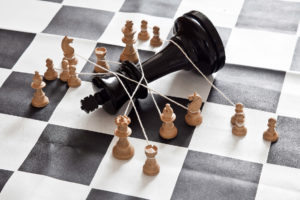CHESS…
The Game Of LIFE!
By Stephen Doherty

“Life is like a game of chess. You cannot undo your moves – but you can make the next move better.” –Anonymous
“CHECK-MATE!” With these words, both of my children gleefully expressed their joy in defeating their father in the classic game of strategy and tactics that I had taught them over Christmas. In an instant – all other games became trivial and passé as chess captured their minds and hearts.
My father taught me to play chess when I was four and I have proudly, and excitedly, passed the torch to my son and daughter. In the few short months since Christmas, both have reveled in the game and quickly came to understand it’s importance and significance to that other game we call life.
Chess finds its roots in India dating back almost 1,500 years. There has never been a game that has so many parallels to the challenges and lessons of life. I was actually stunned to discover recently that there are 400 different positions after each player makes one move apiece. There are 72,084 positions after two moves apiece. There are 9+ million positions after three moves apiece and 288+ billion different possible positions after just four moves apiece!
As in life, there are endless possibilities based on the next moves we make. Like life, complexity and chaos can explode beneath us quickly as we move forward. Some of the other key lessons in chess that mimic life include:
Forward and Backward Moves
You’ve heard the saying, “One step forward, two steps back.” Victory in chess, as in life, requires the ability to gauge when retreat is the best path to victory. Of course, moving forward in attack mode is also crucial, but so many people fail for lack of appreciation and understanding of when stepping back is ultimately the best way forward. Retreat is not defeat – it’s merely rethinking and recalibrating the next move forward.
Weighing Options and Making Sacrifices
Chess strategy often entails sacrificing crucial game pieces toward “the greater good.” (Victory) Whether by circumstance or design – players learn the importance of strategic sacrifice as part of a winning strategy. Life frequently demands the same.
There are no worthwhile goals that we pursue and attain that don’t include all manner of sacrifice, great and small, planned and unplanned, harmless or tragic. Is there any better lesson learned than deferred gratification? Temporary pain and discomfort in exchange for growth and security? Time invested versus time wasted? The concept of sacrifice is one of the cornerstones of success and a substantive and meaningful life.
Strategic Planning
Chess teaches us the difference between strategy and tactics. Between planning and relying on chance and random events. There are parts of society and culture that embrace and treasure the sporadic and the spontaneous as virtuous and meaningful. I believe there is merit in that position and that you can overdo rigor and foresight.
That said, failure to “see” the larger picture and all that entails often results in reliance on chance and luck – trademarks of gambling more than strategic gamesmanship. Chess teaches spatial oversight of the entirety of that which confronts us. This is an invaluable skill that a successful life demands.
Taking Risks
There are few traits more critical to success than learning to value and embrace risk. I have often said that “The greatest moments of our lives are rarely filmed in our comfort zones.” Chess teaches you to take risks because making bold, ballsy moves is safe. After all – it’s just a game. Great, opportunities and new directions often come with risk taking. Taking risks builds confidence, helps you stand out and teaches you new lessons.
As parents, a tear often accompanies the relinquishment of treasured childhood traditions and rituals. I will always remember the joyful days and nights spent with my kids playing such classics as Chutes and Ladders, Sorry, Candyland, Monopoly, Clue, etc. The one (of many) constants in life comes courtesy of Corinthians 13:11 which reminds us, “but when I became grown..I put away childish things.”
Chess is a game but it is an adult game that so perfectly mimics the game of life, I can only feel pride and relief that both of my children have discovered it and find joy and happiness in playing it. And believe me when I tell you that being check-mated in a dozen moves by novices, is very similar to having someone DUNK on you on a basketball court when you least expected it! It feels a lot like…life!
“Chess is the gymnasium of the mind.” – Blaise Pascal

